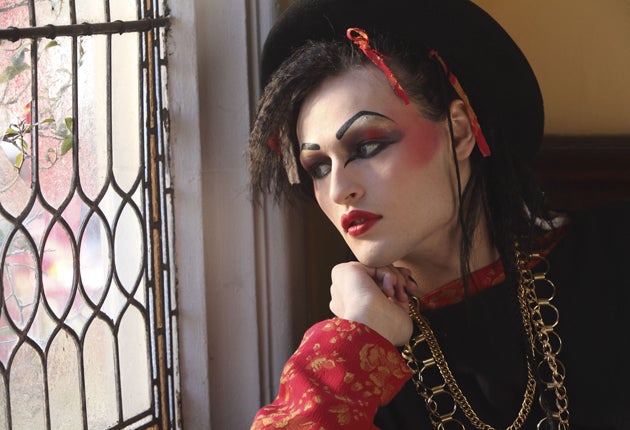Worried About the Boy, BBC2 <br/>Royal Wedding, BBC2<br/>Ashes to Ashes, BBC1
The Eighties wasn't just about trouble and strike: how could it be with New Romantics, a Royal Wedding and time-travelling cops?

Your support helps us to tell the story
From reproductive rights to climate change to Big Tech, The Independent is on the ground when the story is developing. Whether it's investigating the financials of Elon Musk's pro-Trump PAC or producing our latest documentary, 'The A Word', which shines a light on the American women fighting for reproductive rights, we know how important it is to parse out the facts from the messaging.
At such a critical moment in US history, we need reporters on the ground. Your donation allows us to keep sending journalists to speak to both sides of the story.
The Independent is trusted by Americans across the entire political spectrum. And unlike many other quality news outlets, we choose not to lock Americans out of our reporting and analysis with paywalls. We believe quality journalism should be available to everyone, paid for by those who can afford it.
Your support makes all the difference.Would it be wrong to say that the Eighties didn't really get going until 1983, when Margaret Thatcher got back in?
The early part of the decade seemed more like a hangover from the Seventies: a dank, depressed era, cheered up only by Bob Willis, of course, and the emergence of some extraordinary pop culture tribes, the New Romantics certainly being the most spangly. It was to the latter that Boy George loosely belonged. Not that the bio-drama Worried About the Boy, part of the BBC's Eighties season, ever mentioned the New Romantics. In fact, so keen was the drama to avoid what you might call the Wikipedia approach that Culture Club barely got a mention.
Instead, the makers of this intriguing drama focused on two periods in the singer's life: the years before Culture Club, in which he outdressed and outbitched all-comers at London's Blitz club, and his 1986 "drugs hell", besieged by paps in wealthy misery. George was far happier, it suggested, jostling, rowing and partying with the extraordinary peacocks of the Blitz than he ever was achieving his ambition to be famous. Far from original then, but a story worth picking out of the sleazy red-top-friendly facts of George's life.
With a budget that must have run to, ooh, thousands of pounds, the makers wisely spent their pennies on purple eye-shadow and hairspray, and let the cast loose on Tony Basgallop's acid script. As Steve Strange, the gatekeeper of the Blitz, Marc Warren was a hoot, but the latest scion of the Fox clan, Freddie, more than kept up as George's transvestite friend Marilyn. Mathew Horne's steely turn as Jon Moss grounded things nicely; a little of Mark Gatiss's rather grotesque Malcolm McLaren went a long way. The discovery was Douglas Booth as Boy George: moving, witty, he also got the singer's wheezy enunciation down pat; all that, plus cheekbones that Boy George would have killed for.
The big day for Prince Charles and Lady Diana Spencer in 1981 groaned under so many expectations that dramatist Abi Morgan can't be blamed for thinking she could hang the entire premise of her drama, Royal Wedding, from that heady July Wednesday. As her small Welsh home town throws a street party to celebrate their prince's nuptials, Linda (Jodie Whittaker) decides desperately to end her marriage. This prompts a daisy chain of emotional crises in her deadbeat hippie husband, doe-eyed daughter, wannabe-yuppie lover, bolshie lesbian best friend, indeed the entire town as it realises suddenly, half-cut under the bunting, that it faces collective unemployment when the local factory closes down.
At least, that's what I think was going on: the early dialogue seemed to me so elliptically written and so garbled as to be incomprehensible. But the photography had a lovely, woozy, elegiac feel, and the performances were a joy, particularly Darren Boyd as Linda's husband Johnny, wondering when the era of free love finished and why he can't enjoy the day wearing his Y-fronts. But just when I thought I'd enjoyed two dramas (three hours!) set in the Eighties without some footage of Maggie drooling into a mic or a miner getting beaten up, Morgan reached for the clip button to bring her baggy, enjoyable yarn down to earth with a bump. Ah well.
Another bit of Eighties fun came to a close on Friday. Ashes to Ashes may have gone downhill from the heights of Life on Mars, but it had the wind behind it, in the form of Philip Glenister's Gene Hunt duelling with classy Keeley Hawes' Alex Drake. Resolving the premise of the show – not one, but two grievously wounded police officers time-travelling back to DCI Hunt's shabby office, the first in the Seventies, the next a few years later – got the producers in a terrible pickle, though, for this, the show's finale.
The result made for interesting metaphysics, perhaps, but leaden drama. The revelation was that Hunt knew that he and all his team, John Simm's Sam Tyler and Drake included, were dead, and – stay with me here – existing in a form of limbo, albeit with plenty of booze, fags and wrong 'uns to nick. Which made Hunt, I suppose, some sort of Charon, guiding them to the afterlife. Fire up the ferry doesn't quite have the same ring.
Join our commenting forum
Join thought-provoking conversations, follow other Independent readers and see their replies
Comments